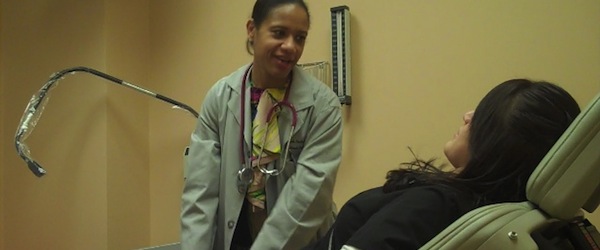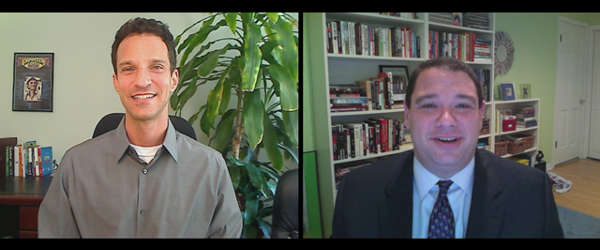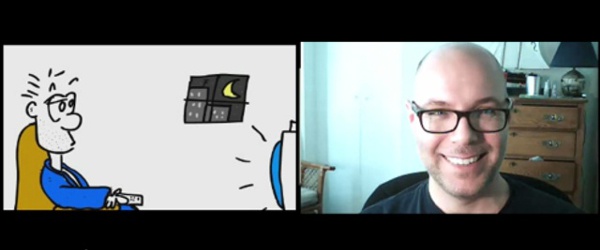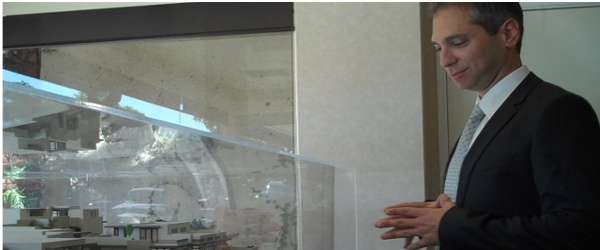Animation careers are growing in popularity and demand.
As today’s media landscape expands, so does the use of animation and computer graphics….and with that comes animation careers. Just ask today’s guest, Odd Todd Rosenberg, who launched a freelance computer animation career when his video about an unemployed cartoon character went viral in 2001.
SNEAK PEEK (Full Episode below)
|
RELATED CAREERS |
Today’s Guest
 Odd Todd Rosenberg: Odd Todd
Odd Todd Rosenberg: Odd Todd
College Major: Communications
College: University of Hartford in Hartford, CT
High School: New Rochelle High School in New Rochelle, NY
First Job Ever: Picking up buckets of golf balls at a driving range
Worst Job Ever: The Gap management training program
Animation Careers
Odd Todd shares great career advice for people interested in animation careers, freelance animation jobs or anyone who wants to pursue their artistic passions. He tells us how birthing one of the web’s first viral videos nearly led to a TV series on Comedy Central and helped establish a computer animation career that has found him doing work for ABC World News, IFC’s “Media Project”, Time magazine’s website, NPR’s website, PBS’ “America’s Test Kitchen”, the History Channel and more.
Animation careers don’t have to mean being self-employed and doing freelance animation jobs like Odd Todd. There are animation careers in multimedia studios and animation studios doing 2D and 3D animation, stop motion animation, character design, working as storyboard artists, art directors, animation producers and more. Arts schools, animation colleges and nationally marketed schools like Full Sail University are now all offering computer animation programs and animation degrees where you can study computer animation, multimedia design, graphic design, video games and more. Choosing a specialization is a good move for those seeking employment.
Odd Todd suggests checking out GoAnimate.com and Flashkit.com as an animation resource plus Freesound.org for sound effects. Programs for computer animation that you’ll want to learn may include Flash, After Effects, Premiere, FlipBook and Anime Studio. Don’t forget his important advice: it’s key that you be able to communicate clearly through your work. All of this will help get you ready for freelance animation jobs and a computer animation career. After watching Odd Todd, you can check out our other videos on Arts & Communications Careers !
FULL EPISODE (Ep. #17)
For our Audio Podcast: Careers Out There on iTunes
TRANSCRIPT OF TODAY’S INTERVIEW
Freelance Animation Jobs 6:25-18:30
Finding Freelance Animation Work 18:30-23:23
Income for Freelance Animation Jobs 23:23-26:05
Rewarding & Challenging Aspects of Animation Careers 26:05-28:38
What It Takes For Animation Careers 28:38-29:40
Types of Animation Careers 29:40-33:14
Keys To Success – Career Advice from Odd Todd 33:14
Careers Out There Host Marc Luber: Hey everyone welcome to Careers Out There, I’m your host Marc Luber and we’re helping you find a career that fits you. Today we’re joined by Todd Rosenberg. Todd – welcome to Careers Out There.
Freelance Animator Odd Todd Rosenberg: Howdy – thank you for having me here.
Host Marc Luber: Absolutely. Todd’s going to talk to us today about freelance animation careers as well as how to turn a negative situation like unemployment into something positive by embracing the Nike philosophy of Just Do It. Todd – let’s start by explaining how your Odd Todd character came to be.
[HOW THE ODD TODD CARTOON WAS BORN starts at 1:15]
Odd Todd Rosenberg: Back in 2001 I was working for a company called Atom Films which is now Atom.com. But what happened was, I was working as a – it was business development basically – and I was laid off in June of 2001. And I’d not really gone into animation before but having the free time of being laid off gave me some time to learn Flash animation. I started taking some online classes and stuff like that and the first cartoon I did, which I put up in November of 2001, was called Laid Off: A Day In the Life and it was a very early sort of viral video. So that sort of kick-started my career change.
Luber: OK. And how did you come up with the character and the voice? How did that whole thing come to be?
Odd Todd: Originally the concept I had – because I didn’t know how to do animation – was to do a 1 minute rant of an unemployed guy and the website was just gonna be one big play button and basically you could go there every day and press play and you’d hear this 1 minute rant. So I sat in my apartment kind of recording just off the cuff stuff, whatever happened that day and I realized that and I was doing it in sort of a gravelly voice because my voice is just like “This is my voice” and it just sounds like my voice and I was like “that’s not a great voice” so I started talking in a different voice. And then I realized that it would lend itself well to animation so I got in touch with some friends that did animation and I was like, “hey – you want to animate some stuff I’m doing?” And they were like “No”. So that’s when I started to kind of poke around with it. But originally it was the audio that was first and then that led to me piecing together the first cartoon once I learned how to do stuff.
Luber: So what led you to wanting to do that kind of stuff in the first place? So you were a business guy and you get laid off and all of a sudden you’re then like “OK, now I’m going to become an animator”.
Odd Todd: My whole background through school and everything else has always been like a lot of doodling. I’d tried to be a cartoonist for years in all sorts of different ways and nothing was really sticking. There was just tons of rejection – like newspaper strips and stuff like that and just like none of it was working so I was just probably at the point where I was going to give up on cartooning in general because it was like eating up…I remember I’d have Sunday and Sunday would be cartooning day and I was thinking – I was like 32 at this point – and I was thinking maybe if I was going to make a living as a cartoonist it would have happened already. And I decided when I got laid off while I was looking for a job and I was interviewing while I was learning animation, I just felt like I had a window of time before I would have to start working again where I could start to kind of tap back into what I had been losing touch with and being unemployed you don’t have – just like the cartoon – there was not a lot I could do – it wasn’t like “going to France!” – you know what I mean? Being locked up in an apartment, you have only so many options. So there was that Tuesday afternoon nothing to do, nowhere to go thing, so I filled up the time
Luber: So basically you were taking a passion that you’d had your whole life and you were kind of setting it aside so you could be like the business guy and all of a sudden the business guy thing falls apart, so you’re like “no what – why not go back to my passion.”
Odd Todd: Yeah. It is weird how it was a bit of, it seemed like fate in play that being laid off led to me doing laid off cartoons and it all kind of came together so it’s nice.
Luber: Yeah, definitely! How did you go about taking that and building it into a career doing freelance animation? How did that happen? Walk us through that.
Odd Todd: I probably had a smoother path than maybe would even be available now. Basically, that first cartoon got a lot of attention. I set up a tip jar on my website so people would give me $1 donations and I ended up tens of thousands of dollars! And at first I was getting press for just collecting the money. Then I started getting press because the Department of Labor came to me because I was collecting this tip money and also collecting unemployment and that ended up being – I actually went with my brother who is a lawyer to fight this case on whether I’m allowed to keep my unemployment or not – and that became a story that ended up on the front page of the Job Market section of the Times and that’s what led to the Today Show and other things. So that amount of attention definitely did open up doors where I soon had a book deal to kind of deal with some of the stuff that I was working on…so there was a really big jumpstart to lead to what I’m doing now.
[FREELANCE ANIMATION JOBS starts at 6:25]
Luber: And explain what it is that you’re doing now. Cause I, until we talked before this interview, I did not know what it meant to be a freelance animator. So for people who are watching who have no clue or for people who are watching who maybe do doodle right now and they’re in high school and they could be you one day – explain what that means. What does a freelance animator do?
Odd Todd: I think all freelance animators seem to carve out unique niches within – whether commercial world or TV world or web stuff or whatever – based on style or tone and things like that, so I basically have – I do cartoon segments for both television and the web. For years I did cartoons for ABC World News where they would kind of take a topic that is maybe confusing or dry or boring and they would say “this is an important thing but to have someone standing there talking about it or showing video clips of it is boring”. And this guy Robert Pulwich, a correspondent at ABC News, got in touch and said “let’s start doing cartoons for the news” and I was like “yeah, right”. And we’ve been working together for 7 or 8 years just making cartoons for various places : NPR’s website and some other places. And other than that, I’m always sort of like looking for work, reaching out to different places that seem to be a clean fit for me. When someone does get in touch like recently History Channel was in touch to maybe have me work on something so I kind of try to follow-up and establish those as not just freelance jobs but as think of me as a go-to place for this style of what I do. So after doing this for years and years you just slowly establish these small networks where hopefully you can get a name of sorts for yourself and people say “hey, you know what would be good – for this thing we’d like an Odd Todd piece”. And I’ve kind of been fumbling around with that for a while. So that’s freelance animation. Other people I know – they work strictly on web stuff – they’ll promote products and things like that. It really depends on the style that you work at. I know other people that work for a studio and they – if they’re really good at let’s say lip sync, and take a freelance job for setting up lip sync for a piece. So there are little components you can work on within other people’s animation – it doesn’t have to be all from scratch.
Luber: So to give people some examples – you said the NPR website, ABC News, History Channel, what are some other types of projects that you’ve worked on – or other outlets that you’ve found for your creative work?
Odd Todd: I do cartoons now for Time magazine’s website, which are just like, being very cool, as long as people walk away with some bit of information that’s interesting, you can kind of do what you want, which is nice. I did cartoons for a show called “America’s Test Kitchen” which is hugely popular – it’s not a cooking show – I forgot how they describe it but I remember being in meetings with them and saying “I love doing stuff for cooking shows” and they were like “we’re not a cooking show”. They basically test products so I did science segments for that show and for the most part, the type of animation that I do is very much describing whether it’s scientific concepts, economic concepts…it’s basically telling a story and having animation kind of accompany it along. And I do a lot of science and a lot of political…some of it’s editorial, some of it’s factual.
Luber: So basically you’re helping people learn in an easier, more fun, easily digestible way.
Odd Todd: Yeah. And to be honest, I feel like this is where education is going. I mean I did a piece, a 5-part series for NPR.org called “It’s All About Carbon” which basically explains how carbon affects – like when people talk about carbon credits or whatever – what is carbon doing to the atmosphere? There’s these loopholes in knowledge where people kind of just assume they know things. And I’m not saying I know anything but it’s that kind of thing where people know global warming, they know carbon, those things have not been connected yet. So that kind of thing is great for 6th graders through anybody who wants to know. So it covers the spectrum. But I think in terms of education, kids learning are so involved with screens and expecting to be entertained in some way. Even like the childhood 2 year old stuff – it’s like “you get to do learning by entertainment” so I think that that type of stuff – cartooning – that really does – basically I was a terrible student. If these things existed when – or were accepted when I was a kid – in the same way as Schoolhouse Rock – I always wondered why there was not more Schoolhouse Rock stuff. I know the preamble still because of it! So I guess that’s hopefully where things are leaning and I would fit in nicely with that. But education is always a tough road.
Luber: I like that Schoolhouse Rock analogy. That’s a good point. That was so helpful for kids of the 70s. Absolutely – they should bring that back – I like that -= maybe that could be your whole thing – build that world! Team up with a good songwriter.
Odd Todd: Yeah!
Luber: I want you to talk about the Africa video because I’m going to show a little snippet of that so everyone could see that. So give a little explanation of that video so people will know what they’re watching.
Odd Todd: There’s a show on IFC called the IFC Media Project which is basically al take on the state of the media. For this piece, and I basically provide animated segments for that on various things – but this one is from when Somali pirates were really in the news and this is a good example of filler as far as a whole story thing. The story is here’s these pirates, and they’re taking over ships and nobody knows why but they’re the badguys and nobody – no one in the media was bothering to say what are they actually doing? And what are they doing with the money? And why are these ships so wide open to be hijacked and everything else that went along with that. There was just this sort of black and white yes, the ship got taken over and they’re the bad guys. So this cartoon kind of says here’s what’s been going on and here’s what has happened to lead to these guys becoming pirates and it’s not necessarily good or bad – it’s just like there’s more to the story than just what you’re hearing in the news. So I like doing cartoons like that.
Luber: Well let’s take a look. Here’s a look at the clip everybody. [CLIP]. OK – so that’s the clip – so Todd – explain to us then, how does that come to be? Do you say to IFC I want to do something on Somali pirates or do they say we’re doing stuff on Somali pirates – be creative and come up with something?
Odd Todd: With Time magazine, they’re kind of like “do whatever you want” which is great. I still give them different ideas they could choose from. With ABC News and IFC, IFC Media Project is a show that’s like a theme so they’ll say we’re doing something on pirates and give the general gist of what they want to say and we will work together on a script and same thing with ABC News. We want to tell the story of this or that and we work at finding the best places to help tell the story in animation. So it’s really kind of an open process – usually, with everyone that I work with. It’s a rare occasion that I have the freedom to just pick something and do something like that.
Luber: But there’s always the opportunity to be creative within whatever it is that you’re doing on any given project.
Odd Todd: Yeah – there is a challenge to figuring out the best way to tell the story. Within the animation, the real tricky part is doing – making sure that there’s no separation between the visual and the audio. Whereas if I do something that’s too crazy in the cartoon, it might be a distraction where someone will be like “oh – what a cute cat” and be like “wait, what were you talking about?” So there’s a seamless flow that is really the toughest part of the work. Just finding that rhythm where they can go hand in hand – it just has to be that 1 thing. Usually the stuff I do is within 2 minutes, so it has to overcome – especially when you talk about ABC News or whatever – the initial shock of your looking at a cartoon. So there is a sensitivity to taking a beat now and then to make sure that people are staying with you.
Luber: So I want to put the audience in the shoes of someone who is getting this assignment to do whatever for Time or IFC or whoever. Do they say do this, make it 2 minutes, get it to us by Tuesday? How does that work? What kind of time frame do you get for a deadline? And do they always tell you how long you should make that video?
Odd Todd: With ABC News it’s strict. It’s down to the second. With the PBS cooking show there’s a little bit more flexibility there I think because there’s no commercials so they could go an extra 20 seconds now and then. Time magazine is like “just don’t make it so long that they’re boring”. So it really depends on the place but for the most part with the IFC show, the ABC show, they will be like “you need to cut 5 seconds off of this” so it comes down to that. But before I really dig in on the animation, I’ll lay out a full audio track that basically get approved in one way or another so we could get a sense of timing and everything else and then occasionally have to go back and cut it down more. So it’s not like “I hope this turns out to be the right time” because the audio will always come first.
[FINDING FREELANCE ANIMATION WORK starts at 18:30]
Luber: OK. And what about actually getting the work? You were talking about the networking and the networks that you’ve developed, the pools of people at different places so you could keep getting new work and keep looking for new work. How does that come to be? If someone is new to this, if someone let’s say is out there right now and they got laid off this year and they’re fresh out of college and they’ve got time, they want to be animators, how do you get work? And after you answer that, I want to circle back to figure out how does someone learn the skills so they could do this in the first place? But first tell us how someone gets work.
Odd Todd: I’m not the greatest at getting work. To be honest. But it really is – the first thing is you have to be open to the idea that I think sometimes I’ll see animators and they won’t want to do any thing but what they want to do…which I think is great but when it comes down to working for a place, you kind of have to give over the reins to a certain degree. I’ve had cartoons that have had great jokes cut out of them or hacked to pieces or whatever, and that’s just part of the thing. But it really is just kind of keeping your eyes open – a lot of stuff I get I’ll go to a cocktail party and be talking to people about what I do and if they say “I know somebody who works as a producer on a TV show” or “do you do commercial work” so there is that shmooziness that comes in handy and also making sure that you keep contacts alive so – you might not hear from someone for 6 months and instead of waiting for it say hey – what are you up to – what are you doing – and stay on as many radar screens you can stay on – and see what comes back. It’s kind of like fishing where it’s like “I don’t know – we’ll throw it over there “– and then you might catch big fish. Then there’s also the challenge of – and it’s still difficult for me years later – the fact that some months are going to be busy and some months just aren’t. So as a freelancer you just have to accept that and not – and this I’m still learning how to do it there is that “oh my god – the phone is never gonna ring again” panic every time it becomes slow…and then somehow when push comes to shove, for the most part, freelancers all have the same panics…and if you can kind of ride out the tougher parts, and continue networking and goin to places that you might not go to otherwise, you find a way through it.
Luber: And how does someone get into this in the first place as far as the skills? I mean, you doodled and you said then you took online classes -= what tools and skills does someone need to develop if someone’s getting out of school now or they’re in school and they want to start learning this or they’re unemployed and they love the cartoons and want to be an animator. What should they be learning? What should they be studying today?
Odd Todd: If they’re in school, I’m sure that schools are now loaded up with computer animation, graphic design classes that I’d never had exposure to because we were like “let’s go to the computer lab and I’ll go home and write this on my word processor”. Sometimes people want to get started with animation to just feel out if it’s right for them. There are some websites that are free on line that kind of – I mean it’s not the ideal place – but I think it’s called Go Animate dot com, which is like you kind of pick characters, add dialogue, add backgrounds and it’s sort of like there is a generic-y flavor to it maybe because it’s like “here’s the pool hall” but people have been creating some original stuff within that so if you’re just slightly interested in it or you feel like it’s something you want to explore, there’s a few of those kind of sites where you can just go on line and make stuff for free before investing in……So if you find that you like it and you’re finding things that you want to do that these things can’t, then you can get Flash or After Effects or something like that but those are expensive programs, unless you can get them for free – which I don’t think you can do any more. You used to be able to but now you can’t because they got really good at that! I have a friend who used to take software off the internet all the time for free and he said you never had to pay for it – but now you have to pay for it. It can cost you $500-$800 per program to do this kind of stuff.
[INCOME FOR FREELANCE ANIMATION JOBS starts at 23:23]
Luber: So if someone’s deciding OK – you bring up the money concept – it’s expensive to buy this stuff – what can someone make financially doing this kind of thing? What is the range that projects pay? Do they base it on how many minutes the video is or how many years of experience you bring to the table? How does the pay work – what’s it like?
Odd Todd: It varies. There is a feeling like if somebody calls me up and they are a small business, I can ask them what their budget is and what they’re looking for because I don’t want to be like, “It’s going to cost you THIS amount” so first thing I’d be looking to get a rough idea of what kind of money they’d be looking to spend. Other times Blue Cross is in touch or a law firm is in touch and I know there’s money there, and it’s surprising because sometimes the smaller places have more money than the big places realistically. So finding out their budget first is an ideal starting point. Other than that, there is for me, ideally I like to base stuff on every 30 seconds, every minute, every 2 minutes…and kind of use the time of it but when it comes down to animation if I’m drawing or animating charts and graphs as opposed to say 3 people sitting around a table, I can do a few minutes of charts and graphs a lot faster than I can do 4 people sitting around for 30 seconds.
Luber: So it depends on the scenario. It depends on each individual project.
Odd Todd: Yeah, it’s a sliding scale of the amount of work that goes into it combined with what their budget might be.
Luber: Can you give some kind of an example of what, if someone is trying to figure out OK, if I grabbed a project of some of the stuff they might be able to find of yours and watch on You Tube, can you give some kind of range of what some of those might pay out?
Odd Todd: I can put it this way. For a lower-end job I can do something depending on how quick it is for probably a $1,000 minimum for a cartoon. For a big series type of piece, it goes well into the tens of thousands of dollars but those are few and far between sometimes.
[REWARDING & CHALLENGING ASPECTS OF ANIMATION CAREERS starts at 26:05]
Luber: So the most rewarding aspect of this – what would you say?
Odd Todd: For me personally, I still feel blessed that I’m able to kind of make a living doing this. There is, as much as this career is ups and downs and there’s been disappointments here and there or whatever, I’m still wildly appreciative of the fact that this is what I’m doing and I still can’t believe this is what I do. Even when I get asked at parties “What do you do” and I’m like “I’m an animator” it still kind of feels weird to even say. But I really do dig it when people really take away something, whether it’s like a really good laugh or something that like say with the pirate piece for IFC, it felt good to be like you know what – here’s another side to this story and people, I feel like the idea that information is generally getting across – there’s so much stuff on the web that’s so disposable that I think that there’s something that you watch and you take something away with it – it’s a rewarding thing. It really is.
Luber: And what about the most challenging part? If you had to weed people out and say if you can’t handle this, then this path is definitely not for you – what would that be?
Odd Todd: You have to play well with others. There are some people who have an amazing range of styles. I only have like 1 sort of style which is good and bad. The one thing is – there is a bit of an artistic compromise if you work with companies – sometimes it’s for better, sometimes for worse. But there is a strong sense for all artists that “I need this to be this way” and sometimes you just have to kind of say “they’re paying – and if they really want it to be like that, that’s the way it’s gonna be, because the more time I spend arguing the less I’m going to be paid.” The more time you burn on back and forth, the by the hour fee starts to go down.
[WHAT IT TAKES FOR ANIMATION CAREERS starts at 28:38]
Luber: Right. So clearly, someone needs to be flexible, creative, able to network….whatever personality traits would you say are important? Skills or personality traits that someone needs to have in order to really handle being able to do what you do?
Odd Todd: I’d say just like anything else, the more motivated you are the more…..There’s a fine line between being aggressive and being motivated, but the more….It’s a little bit difficult for me because I’ve had sort of probably a different starting point trajectory situation. But I think there’s a lot that can be taken away from just kind of getting ingrained within the animation community. I did something over the weekend where I was on a panel with a bunch of animators and we all just started talking about how we’ve all kind of fumbled our way through to figuring out what this specific career is going to be. One woman on the panel just finished a feature film and she somehow gathered up some producer money to get funding to do her own project. There are other people who do straight commercial work. There’s a lot to be apparently in terms of attention and maybe some money on the festival circuit. So depending on the style: if you’re a commercial animator, there’s one specific path. If you’re doing artsy path, there’s one path. If you’re more about children’s stuff and getting into television, it’s important now to have what’s called an animatic, which is at least like 7 minutes or so of who the characters are so network people can get a feel for what that show will be. I don’t think it’s easy to just go in and pitch an animated show with no animation to show – especially now – so it really depends on the path.
[TYPES OF ANIMATION CAREERS starts at 29:40]
Luber: I was going to ask you that next – where can you take this? Is this something where you want to take it to doing full animated shows like The Simpsons? Is that one of your goals? And is that the normal progression for someone who does what you do?
Odd Todd: Yeah, I would love to work on a TV show of sorts. Every summer, July or August is sort of pitch season for television. So I try to at least go out with something every summer, whether that’s one thing or a few projects or whatever…and it’s hard. Obviously, there’s a lot of competition to get a show on the air. I’ve been close a couple times. Unfortunately, stuff didn’t shake out…but that’s part of the thing too – just making sure that those setbacks don’t set you back. That’s just the deal. As much as, unfortunately what happened with my unemployed character not making it to television was sort of a tragic story, when you talk to people in television, everyone in television has sort of had some sort of heartbreaking loss. And it’s just keeping fresh and kind of having to say that’s part of the deal.
Luber: And so the audience knows: Odd Todd the character did almost have a TV show?
Odd Todd: He did. It was 2004, I think, maybe into 2005, he was picked up by Comedy Central to have a half hour show. The show was basically in development with a staff of writers and all that sort of stuff and unfortunately, at the time my experience was not quite enough to be in charge of the show. I’d never really worked on a television show before, so there was a person who was controlling the show who did not control it right. And it ended up spending a lot of money and it didn’t make it through the process. It was sad. So there’s that but he has been sold in other ways and other forms that are still sort of alive, so he might be a movie, he might not be a movie, but there is still life in him in other places, so that’s good.
[KEYS TO SUCCESS – CAREER ADVICE FROM ODD TODD starts at 33:14]
Luber: Good! So your advice to people who are in that situation of being laid off, and how you turned this negative into a positive, is exactly that? Stay motivated and focus on those things and make it happen?
Odd Todd: I think unfortunately, I’ve seen people who’ve tried to relaunch a career go at it and expect results to happen almost too fast and then it gets discouraging. Sometimes it’s just – if someone decides they want to be a magazine writer or something like that – and they send out a bunch of samples or they get 1 magazine and it doesn’t go well or whatever, there is that feeling like alright, an acceptance to the fact that you may be doing what you’ve been doing on your own for a while…and it might seem difficult because people will be afraid of what other people think. Like oh, you’re doing this – you’re trying to design a new sneaker or something like that and people think you’re crazy if you’re doing that – or you’re wasting your time or you’re wasting your money or whatever. And before you’re successful at doing whatever it is that that is, there will be that kind of undertone – it’s almost like an embarrassment of having to explain what it is that you’re doing – and somehow it’s not justified yet because it’s not proven to be successful or whatever….and that’s almost like the biggest hit sometimes. Just saying you know what – if you want to think I’m a friggin idiot or whatever, or I’m wasting my time, then that’s just something that you have to live with.
Luber: Right. So you just do it and don’t care about what other people say if you believe in it.
Odd Todd: Yeah. And I really do believe in the idea that you just keep doing it and doing it and doing it and even if nothing seems to be coming of it, somehow people who just are persistent and keep doing something – even if it’s for themselves – even like poets – who have a difficult time finding a place to put their talents – by just being persistent, find outlets…..and somehow find a pathway for it. Some could be great things or some could just be something that will – like if you write poetry or write short stories, it just might be a place to keep you motivated to keep doing it – even if you can’t make a living at it – you can at least carve out something that – I don’t want to say legitimizes – but something that you can keep feeding.
Luber: So don’t worry about the money is what you’re saying.
Odd Todd: For a while you can’t – especially now. You have to assume that you’re not going to make money and then figure that that will figure itself out some other way. But at the beginning, the first few months, considering especially you’re going to have to put some sort of investment into stuff and spend money on stuff, there is a reality that until you haven’t yet gotten your footing in what you’re trying to do, that it will take months and months at the very least to even start to figure out how you would even make money. So it’s that kind of thing.
Luber: Right. And would those all be your keys to success? Or do you have any other keys to success to share? Or would your character Odd Todd have any keys to success to share?
Odd Todd: Odd Todd’s key to success would be that when that character is having a day where he’s like, let’s say you spent the day drinking coffee, reading a book, taking a walk in a park and maybe you’re not making any money or whatever, you eat a hot dog, you have a beer later that day with friends – like that day is a good day! It might not be ideal – you didn’t get the call back you wanted or you didn’t get the email that you wanted back, but if you spent a day drinking coffee in the morning and it’s all your day – and you walked in the park and you got to hang out with some friends and have some beers at night – and you think you had a bad day? Then that’s the attitude that’s got to change.
Luber: So enjoy life!
Odd Todd: Yeah, it’s really true! I feel fortunate that I have more flexibility to do what I want to do during the day but it is that kind of thing where the idea that being unemployed gives you a freedom to just do some things – like go to the drug store or whatever the things are you have to do – and just take advantage – because the truth of the matter is, if you’re looking for a job, there’s not that much you can do during the day. You can do what you can do – and then you have your day – and you should appreciate the day. Either working on whatever it is that you want to be doing other than looking for a job – or just going out and doing something that’s fun – that’s cool – and free.
Luber: Yup – that’s good advice. Very good advice! As always everybody, real advice from real professionals like Todd Rosenberg here. Todd, thank you for joining us at Careers Out There.
Odd Todd: Thank you!
Luber: You guys – let’s open it up – leave some feedback in the comments section. Do you have creative jobs? Do you do animation? Let us know what it’s like for you. Let us know what your experience has been. Let us know if we’ve covered the stuff that you want to know or if there’s stuff that we left out that you really wanted us to get to. Again, Todd, thank you for joining us. Everyone – I’m Marc Luber – thanks again for watching Careers Out There – and we look forward to seeing you again soon. Take care.
© 2010 Careers Out There
RELATED CAREER VIDEOS
Video Game Tester Career
Rock Drummer Talks Music Business & Guides Young Musicians
Writing Careers: Interview with Writer-Author Brad Herzog








What an interesting field, it’s not really discussed much, anywhere. Thanks for bringing it.
Great interview. I have been a fan from the first cartoon. I am in school for video and animation and I half joked with one of my instructors that if you need any videos done. She teaches basic studied skills classes to community college students and said she would love some animation to go with her classes. So I am going to meet with her on Monday to talk about it. We will see how it goes.
Hey Brian – thanks for the feedback. Yeah, Todd’s stuff is great. Good move speaking up to your instructor – I hope it turns in to some freelance animation opportunities! Go to Zingerman’s for me!